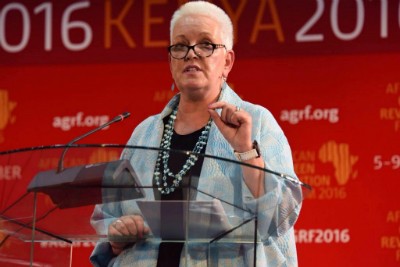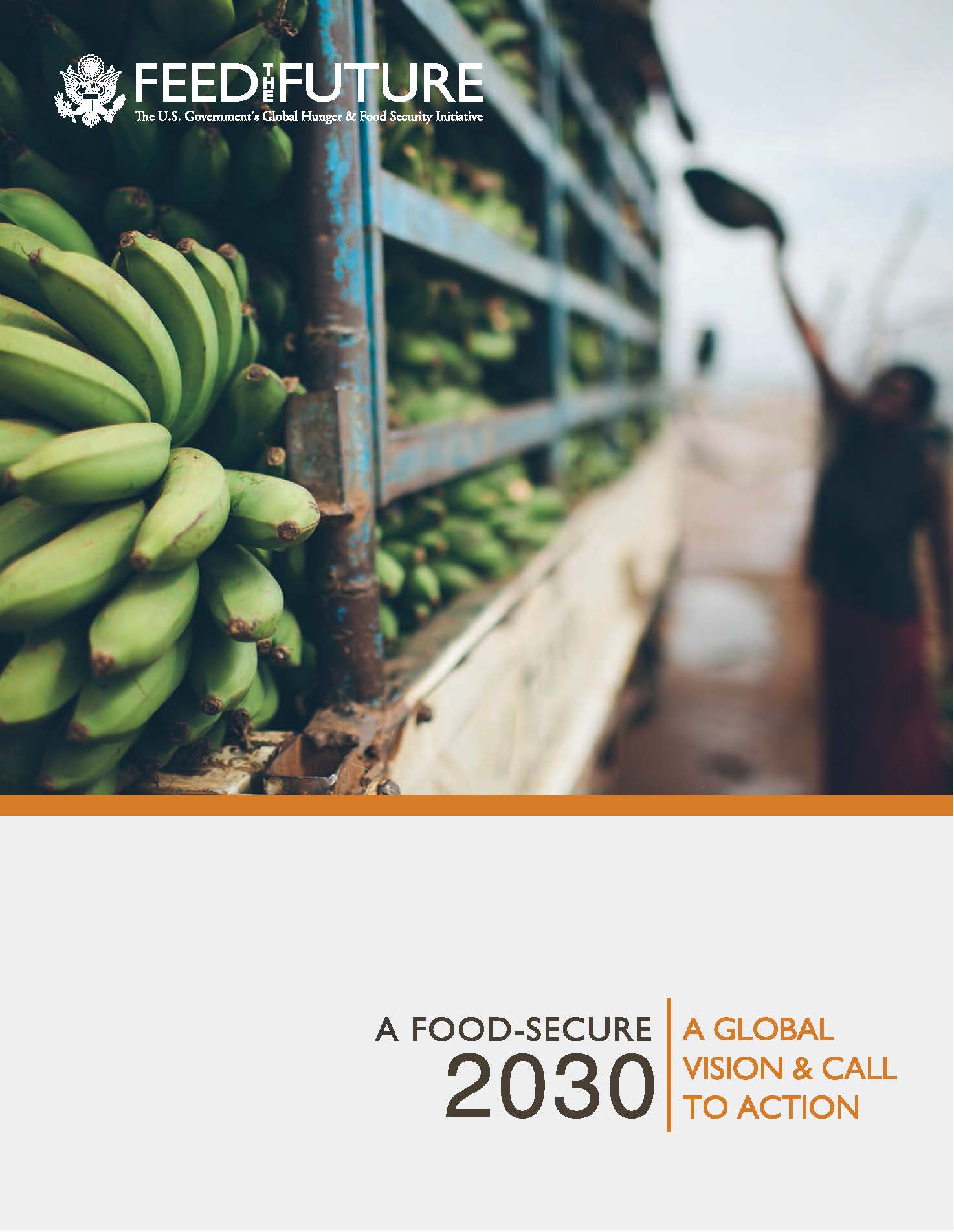
Administrator Smith attended the African Green Revolution Forum in Nairobi, Kenya, where she launched a "A Food-Secure 2030," calling on donors to be bold and do their part to achieve a world free from acute hunger, malnutrition, and poverty. The U.S. Government has already invested more than $6.6 billion in global food security and nutrition efforts through Feed the Future. The Global Food Security Act - the largest development authorization the U.S. Congress has made in a decade - signals the U.S. Government's enduring commitment to global food security and nutrition. Read more from the Forum.
[Remarks as delivered]
Thank you very much. Good afternoon, everyone.
First let me thank Agnes and the entire team for organizing such an important event, and for inviting me to participate.
President Kenyatta, let me thank you, your government, and the people of Kenya for your warm hospitality.
I was last here with President Obama last summer. I’m delighted to be back. I don’t know if you’ve ever spent a summer in Washington, D.C.; when I return I will be starting a program under AGOA to import Kenyan weather.
I also have to say, those of you who know me might not know that I did really well in school. You know that I’m terrible at protocol. I live in fear that I will leave someone out. So let me simply say President Kenyatta, President Kagame, former Presidents Obasanjo and Kikwete, ministers, government officials, colleagues, ambassadors, young people, old people, entrepreneurs, thinkers, doers, scientists, researchers, farmers: thank you for the opportunity to be here.
It’s personal for me to be here in the sense that 30 years ago my education in Africa started during the worst famine in history at that time. And it was the worst scene you could imagine. Many of you saw it.
And here today we’ve got heads of state on a panel talking about climate change, fertilizer prices, capital needed for farmers, pledging more resources, and challenging banks to step up.
I think that agricultural transformation is a goal, but I think it’s a process that’s underway. And I’m honored deeply that USAID and the U.S. Government have been a part of it.
I’m also honored and privileged to be here because for eight years I’ve had the honor of serving a president named Barack Obama. And you may have heard we’re having an election.
So there are a lot of people talking about legacy. Now President Obama has said he will leave it to historians to write his legacy. I’m going to go ahead and say something about his legacy because it’s one you all have been a very big part of.
Six weeks after he was elected we saw the spike in food prices around the world that plunged 100 million people into abject poverty, led to widespread demonstrations in over 40 countries, and sparked the highest demand for food stamps we have ever seen in the United States.
The President, from London at the G20, said we need a global food security initiative. And I want action, and I want it now. Well, he’s the President. And as you saw on stage, when a president says they want action, and they want action now, they get it.
A Food-Secure 2030: A Global Vision and Call to Action ![]() (pdf - 1.8MB)
(pdf - 1.8MB)
We turned to Africa to build that initiative. Because of the leadership that had been demonstrated at Maputo, the leadership that had been demonstrated by the African Union, and Rhoda and her team, to call for increases in investment and a national food security plan for all African countries.
By building on that and working with you, we have been able to transform the agricultural sector – in Africa, and around the world – into an engine of inclusive growth, and to help people everywhere get the nutritious foods they need to be healthy and whole.
This is the work that brings all of us together today. It’s hard work. And though we’ve accomplished a great deal, as you’ve heard, much is still unfinished.
But I’m extremely confident.
I’m confident because food security is now on the world’s agenda. Eight years ago, it was not. Agriculture had fallen off the map. The vision of country leadership and sustained agricultural investment first put forth by African leaders has been echoed and reinforced in cities all over the world – from Rome to Malabo to New York City. Food security, shaped by our partnership with you, is a central part of USAID’s ongoing development dialogue with China, and countries in Asia and Latin America have followed your lead with their own plans to boost agricultural investments and fight hunger.
I’m confident because African leaders – including those I am honored to share the stage with – have followed through on their commitments, and even built on them today. You have funneled serious political capital into this thing called development, even when it was hard. And I want to say again Rhoda to you that the leadership of the AU has been critical in this regard. Because when leaders from all over the continent come together to say that agriculture is a priority, it creates an opening for the bold agriculture or finance minister – not unlike my friend Agnes – to make some headway. When African leaders come to the negotiating table with a unified position on the Sustainable Development Goals, they show the world that Africa’s not a topic of conversation; it is driving the conversation.
So I’m confident because of Africa’s leaders. I’m also confident because in my country, leaders of both parties – who don’t agree on much these days – have come together to solidify our nation’s enduring commitment to ending hunger and malnutrition, and to helping smallholders thrive. And when President Obama signed the Global Food Security Act this summer, that commitment – along with the authorization for the resources necessary to back it up – became law in the United States.
This is our commitment to you. That what President Obama has been able to build on the foundations you have set is something that will continue and endure.
I’m also confident because I think we increasingly know how to get to a food-secure world by 2030. We’ve got the evidence to guide us. We know that investing in agriculture is the most effective way to reduce extreme poverty in low-income countries. And we know that when we get subsistence farmers – especially women – the tools they need to increase productivity and the nutritional value of their crops, and connect them to markets to sell their goods, and the finance opportunities they need to grow their businesses, we see the impacts ripple across their communities. Feed the Future has the results to prove it. Childhood stunting in parts of Ghana, down by 17 percent. In Rwanda, by 14 percent. Notable drops in poverty in Ethiopia, Liberia, Malawi, and here in Kenya. Across the continent.
That’s real change affecting real people. And the truth is that we wouldn’t be seeing these kinds of outcomes in such a short time without strong country leadership, without empowered and capable citizens, without responsible private investment, and without strategic support from the donor community. These are the same ingredients we need to meet the SDGs.
We’ve laid out what we believe are key ingredients in meeting the SDGs for achieving a food-secure 2030. And let me just say, since the heading says I’m going to set the stage a bit, what we think those are.
The first is something you’ve heard from the heads of state about, which is how do we sustainably finance the agricultural sector. We’ve got to focus much more, and much more broadly on that. That means bringing to bear all three streams of capital that were agreed to at the Financing for Development conference. We need smarter and more targeted donor assistance. We pledge to be smart and targeted. We need capital from governments themselves, like the announcement we heard earlier here today. And improved ability to generate the domestic resources that will finance the ag sector over time.
And we need private capital. Sustained private capital. Unless and until we work on all three of those at the same time, we’ll make progress, but we won’t catch up, and we won’t sustain it.
Second we need investment of political capital. Now I said something about that already, but you just saw a little bit of it when President Kenyatta was up here and not only pledged more resources, but called for a scorecard to say that we need, all of us, to measure ourselves transparently and hold ourselves accountable. That’s the kind of political capital that has brought the change we’ve seen so far.
Third, we need the policies and institutions that will create the opportunities that farmers need. And this is the hardest part, but it’s a key ingredient. It’s the policies that will allow and sustain innovation. It’s the policies that will allow the commitments made at Malabo on regional integration to reach fruition. It’s the institutions that are strong and transparent and accountable, but also nimble because this field changes.
The last thing we think we need is what we would call a Plan B, or resilience. And this is something our Kenyan hosts know something about. A few years ago, when a drought threatened the lives and livelihoods of many and drained billions from the national economy, the Government of Kenya stepped up with new commitments and policies to better manage the drought cycle and build the capacity of vulnerable communities to not only withstand droughts and other shocks, but to chart a sustainable and resilient pathway out of poverty.
We have seen the evidence here in east Africa, and in the Sahel, that investments in resilience work and reduce the vulnerability of the poor to external shocks. We also know that external shocks are coming. Commodity price fluctuation. Climate change. Wars and conflicts. Scaling resilience is the fourth and critical ingredient.
As I said I’m extremely confident, and I pledge to you that the United States, USAID – led by Beth Dunford, who leads our Bureau for Food Security – will continue to deliver on our commitment to food security. Together, I believe we can and should invest political capital in this effort, but not politics. We’ve learned in the U.S. that it works when it’s a national project. That we need to keep driving with evidence – the beauty of this effort is we can show people results, and the science and the facts that got us there.
If we together unleash the power that comes when you marry the creativity and optimism of youth to the power of innovation, and that we always listen to the ground.
President Obama’s name, I hope, will forever and rightly be attached to U.S. work on food security. But that name is now shared: by both parties, by two branches of government, by our government and our civil society, by our faith community, universities, scientists, foundations, and the private sector. We’ve built a coalition that will sustain this effort because you have provided the evidence that it can work.
We pledge to you our solidarity but most, I would like to offer you our thanks. We’ve been able to achieve a lot, but we wouldn’t have done it without the work that you have done.
Thank you very much.
Related Speeches
- 6th Mara Day Celebration - Remarks by Brad Arsenault, Deputy Director for East Africa and Operations, Environment Office, USAID Kenya and East Africa
- Signing of a Memorandum of Understanding between Power Africa and the Nile Basin Initiative - Remarks by USAID Kenya and East Africa Deputy Mission Director Dr. Tina Dooley-Jones








Comment
Make a general inquiry or suggest an improvement.